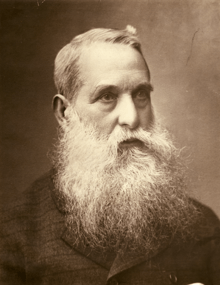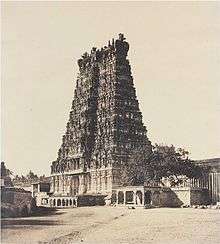Linnaeus Tripe
Linnaeus Tripe (14 April 1822 – 2 March 1902) was a British pioneer of photography, best known for his photographs of India and Burma taken in the 1850s.

Early life

Linnaeus Tripe was born in Plymouth Dock (now Devonport), Devon, to Mary (1786–1842) and Cornelius (1785–1860). He was the ninth of twelve children. He joined the East India Company army in 1838, and in 1840, became a lieutenant based in the south of India. He returned to England in 1850, on a leave that was extended due to ill health until 1854. During this time he began to experiment with photography, and joined the Photographic Society of London in 1853. He returned to Bangalore, India, as a captain in June 1854. In December of that year he made his first photographs of India. In February of the following year he took part in the Madras Exhibition of Raw Products, Arts, and Manufactures of Southern India, displaying 68 photographs of previously unphotographed temples. The jury declared these photographs the "Best series of photographic views on paper."[1] He won a gold medal for for his series of Calotypes, illustrating Burmese architecture and ornament.[2]
Further comment in the jury report, noted the artistic qualities in Tripe's works:
"...it would be supposed from the nature of Photography that all pictures executed by its means must possess a similarity of style ; it is however a curious fact, that this is not the case, the works by one operator being perfectly distinct in character from those by another, even when the same description of apparatus and the same process has been used ; this may be observed, when two pictures have been taken by different exhibitors from the same view — the best Indian Photographs in the Exhibition, those by Capt. Tripe and Capt. Greenlaw', exemplify this in a marked manner. The views by Capt. Tripe excel in finish and delicacy — those by Capt. Greenlaw in boldness, freedom and effect, the former are perhaps the best photographs, but the latter are the best pictures. The Calotypes taken in Burmah and exhibited by Capt. Tripe are excellent ; remarkable for great distinctness and also for their unusual and beautiful tint. When all are so excellent it is difficult to particularize any as especially worthy of notice."
Burma
After the second [Anglo-Burmese war] a British mission in 1855 attempted to persuade the Burmese king, Mindon Min to ratify a treaty transferring Pegu to British rule. The mission was lead by Major Arthur Phayre, with Henry Yule as the secretary. Photography was becoming the preferred medium for creating a visual record for reasons of economy and accuracy.[3] Tripe - already known as a photographer from his time in India, was chosen by Lord Dalhousie to accompany an official expedition to Ava, Burma to obtain representations of scenes and buildings. This visit resulted in the publication of Views of Burma. The Indian government requested that 50 sets of prints be produced and 20 were requisitioned by the Court of Directors of the East India Company. Of these, 7 complete sets are held in galleries, libraries and museums.[3] Tripe returned to India and spent nearly 2 years printing the photographs, including painstaking retouching of clouds and skies, introducing an aesthetic into the documentary purpose.[4]
.jpg)
Madras
In March 1857 he became official photographer to the Madras government, taking photographs of objects shown at the Madras exhibition and portraits of Madras residents. In 1858, he took photographs of subjects of architectural or antiquarian interest, and pictures useful from a practical, engineering perspective. He exhibited 50 photographs from this tour in the annual exhibition of the Photographic Society of Madras in 1859. In March 1862 a series of his photographs were exhibited by Professor Archer at a meeting of the Photographic Society showing 'Poodoocotah, Madura, Ruakotta, Seringham, the Elliot Marbles, &c., &c.' [5] These photographs are now in the British Library, while the marbles are in the British Museum.[6]
Following the Indian Rebellion of 1857, control of India went to the British Crown, and in June 1859 Tripe was ordered not to undertake any new work. At the end of that year he was told to close the business and sell off the equipment. One of his assistants, C. Iyahswamy, also became a talented photographer.[7]
Return to the army
In 1863 Tripe returned to the army and was continually promoted, becoming colonel in August 1873. Whilst in Lower Burma in February 1869 he made his two final series of photographs. Here he took photographs of landscapes made on glass negatives. Tripe left India in 1873 and retired from the Army in April 1874. He died in Devonport on 2 March 1902.[8]
References
- Report of the Juries. Madras. 1856. p. 124.
- Madras Exhibition of Raw Products, Arts, and Manufactures of Southern India. Reports by the juries on the subjects in the thirty classes into which the exhibition was divided. Madras. 1856. p. 187.
- Tsara, Olga (2007). "Linnaeus Tripe's Views of Burma". La Trobe journal. 79: 55.
- Roy, Malini (2015). "Captain Linnaeus Tripe: Photographer of India and Burma]. African and Asian studies blog". British Library.
- Journal of the Photographic Society, 15 March 1862, p. 12
- Photos of the Elliot Marbles, Linnaeus Tripe, British Library, retrieved 19 December 2013
- "Madras journal of literature and science". Madras, Madras Literary Society and Auxiliary of the Royal Asiatic Society, Old College, Nungumbaukum. May 9, 1833 – via Internet Archive.
- "Linnaeus Tripe". Archived from the original on October 11, 2012.
External links
| Wikimedia Commons has media related to Linnaeus Tripe. |